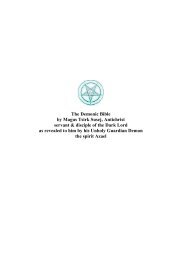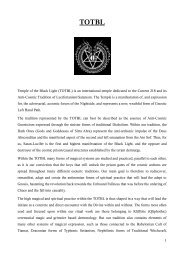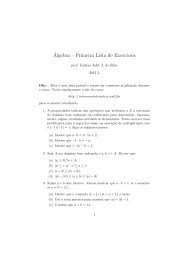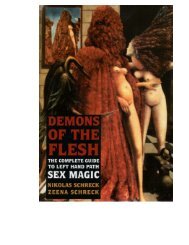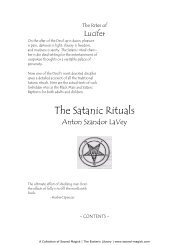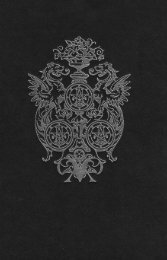Satanism Today - An Encyclopedia of Religion, Folklore and Popular ...
Satanism Today - An Encyclopedia of Religion, Folklore and Popular ...
Satanism Today - An Encyclopedia of Religion, Folklore and Popular ...
Create successful ePaper yourself
Turn your PDF publications into a flip-book with our unique Google optimized e-Paper software.
14 Aquino, Michael A.<br />
demons who, though many were originally not so<br />
bad, had become hardened in their evil. For<br />
example, in Summa Theologica he says,<br />
<strong>An</strong>d it must be said that there is sorrow in<br />
them; because sorrow, as denoting a simple<br />
act <strong>of</strong> will, is nothing else than the resistance<br />
<strong>of</strong> the will to what is, or what is not. Now it is<br />
evident that the demons would wish many<br />
things not to be, which are, <strong>and</strong> others to be,<br />
which are not; for, out <strong>of</strong> envy, they would<br />
wish others to be damned, who are saved.<br />
Consequently sorrow must be said to exist in<br />
them, <strong>and</strong> especially because it is <strong>of</strong> the very<br />
notion <strong>of</strong> punishment that it be repugnant to<br />
the will. Moreover, they are deprived <strong>of</strong><br />
happiness, which they desire naturally.<br />
While condemned to hell, Thomas asserted<br />
that demons would float in the air until the day <strong>of</strong><br />
judgment in the form <strong>of</strong> incubi (male demons)<br />
<strong>and</strong> succubi (female demons). Like other medieval<br />
thinkers, Aquinas believed that demons could<br />
seduce human beings, particularly in the dream<br />
state. He further speculated that should a succubi<br />
conceive after having intercourse with a man, the<br />
result would be a giant, like the Nephilim<br />
mentioned in Genesis 6:4.<br />
Aquinas also perceived dark forces at work<br />
behind many cases <strong>of</strong> dream divination. He<br />
distinguished between lawful dreams proceeding<br />
from natural causes or divine revelation <strong>and</strong><br />
dreams proceeding from demons: “But if divination<br />
<strong>of</strong> this kind arises from a revelation by<br />
demons with whom there is an agreement either<br />
openly because they have been invoked to this<br />
end, or implicitly because a divination <strong>of</strong> this<br />
kind is extended beyond what it can possibly<br />
reach, the divination will be unlawful <strong>and</strong> superstitious.”<br />
This negative judgment derives ultimately<br />
from Deuteronomy 18:10, mistranslated<br />
by Jerome to say, “Let there not be found among<br />
you him who observes dreams.”<br />
See also Demons; Incubi <strong>and</strong> Succubi; Nightmares<br />
For Further Reading:<br />
Alger, William Rounseville. The Destiny <strong>of</strong> the Soul.<br />
A Critical History <strong>of</strong> the Doctrine <strong>of</strong> a Future Life.<br />
New York: Greenwood Press, 1968.<br />
Edward, Paul, ed. The <strong>Encyclopedia</strong> <strong>of</strong> Philosophy.<br />
New York: Macmillan, 1967.<br />
MacGregor, Geddes. <strong>An</strong>gels. Ministers <strong>of</strong> Grace. New<br />
York: Paragon House Publishers, 1988.<br />
Magill, Frank N., ed. Masterpieces <strong>of</strong> World<br />
Philosophy. New York: HarperCollins, 1990.<br />
Maritan, Jacques. The Sin <strong>of</strong> the <strong>An</strong>gel. <strong>An</strong> Essay on a<br />
Re-Interpretation <strong>of</strong> Some Thomistic Positions.<br />
Westminster, Maryl<strong>and</strong>: Newman Press, 1959.<br />
Pegis, <strong>An</strong>ton C. Basic Writings <strong>of</strong> Saint Thomas<br />
Aquinas. New York: R<strong>and</strong>om House, 1945.<br />
Tugwell, Simon. Human Immortality <strong>and</strong> the<br />
Redemption <strong>of</strong> Death. London: Darton,<br />
Longman <strong>and</strong> Todd, 1990.<br />
Aquino, Michael A.<br />
Michael Aquino (b. October 16, 1946), founder <strong>of</strong><br />
the Temple <strong>of</strong> Set, was born in San Francisco,<br />
California. After earning a B.A. (1968) in Political<br />
Science from the University <strong>of</strong> California, Santa<br />
Barbara, he was commissioned in the army as a<br />
Special Operations Officer (Intelligence, Special<br />
Forces, Psychological Operations, Civil Affairs,<br />
<strong>and</strong> Politico-Military Affairs).<br />
Just before a 1969–1970 tour <strong>of</strong> duty in<br />
Vietnam, he joined the Church <strong>of</strong> Satan, founded<br />
by <strong>An</strong>ton LaVey, <strong>and</strong> was ordained to its priesthood<br />
upon his return to the United States.<br />
Assigned by the army to Fort Knox, Kentucky, he<br />
organized a local “grotto” in nearby Louisville,<br />
then gradually became the senior coordinator <strong>of</strong><br />
grotto activities throughout the United States.<br />
In 1975, because <strong>of</strong> a decision by <strong>An</strong>ton LaVey<br />
to give away church priesthoods, Aquino <strong>and</strong> most<br />
<strong>of</strong> the existing national leadership <strong>of</strong> the church<br />
resigned. Shortly thereafter they founded the<br />
Temple <strong>of</strong> Set as an intended continuation <strong>and</strong><br />
evolution <strong>of</strong> the church into a context intentionally<br />
divorced from Judeo-Christian mythology.<br />
Aquino served as the Temple <strong>of</strong> Set’s High Priest<br />
until 1996, at which time he retired from the<br />
<strong>of</strong>fice, while remaining an active member.<br />
The Temple <strong>of</strong> Set teaches that what<br />
Christianity has called “Satan” is a corruption <strong>of</strong><br />
the Egyptian figure <strong>of</strong> Set. Set is not understood as<br />
a god <strong>of</strong> evil, but rather the personification <strong>of</strong> the<br />
individual consciousness or psyche. Members<br />
(“Setians”) can explore the temple’s philosophy<br />
individually, or through local groups called




